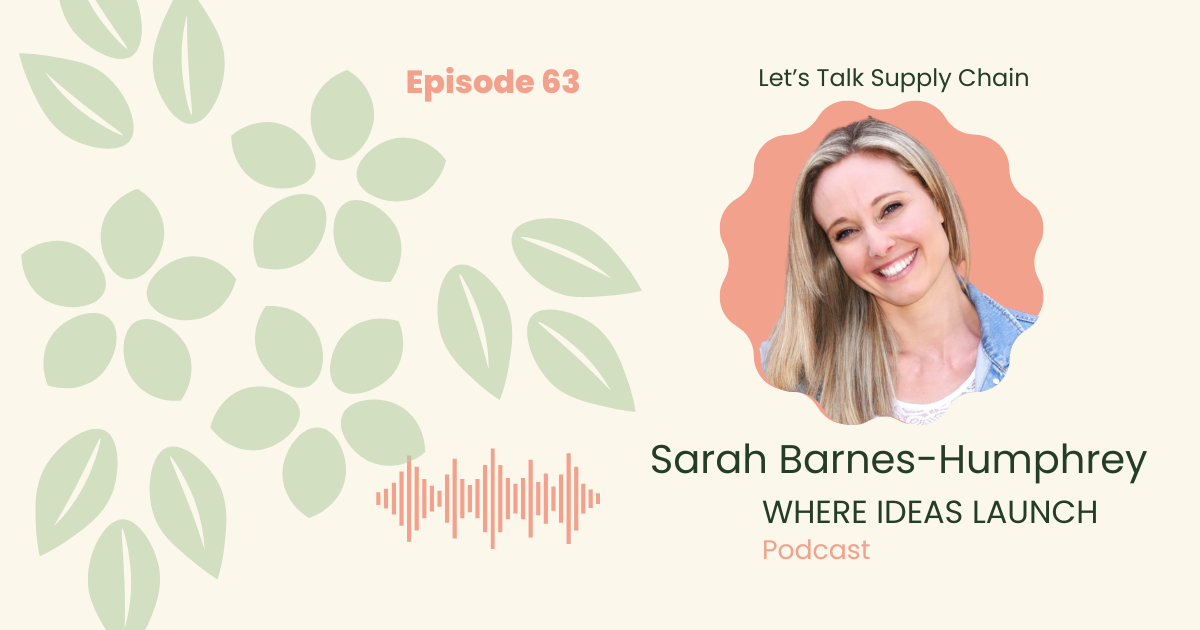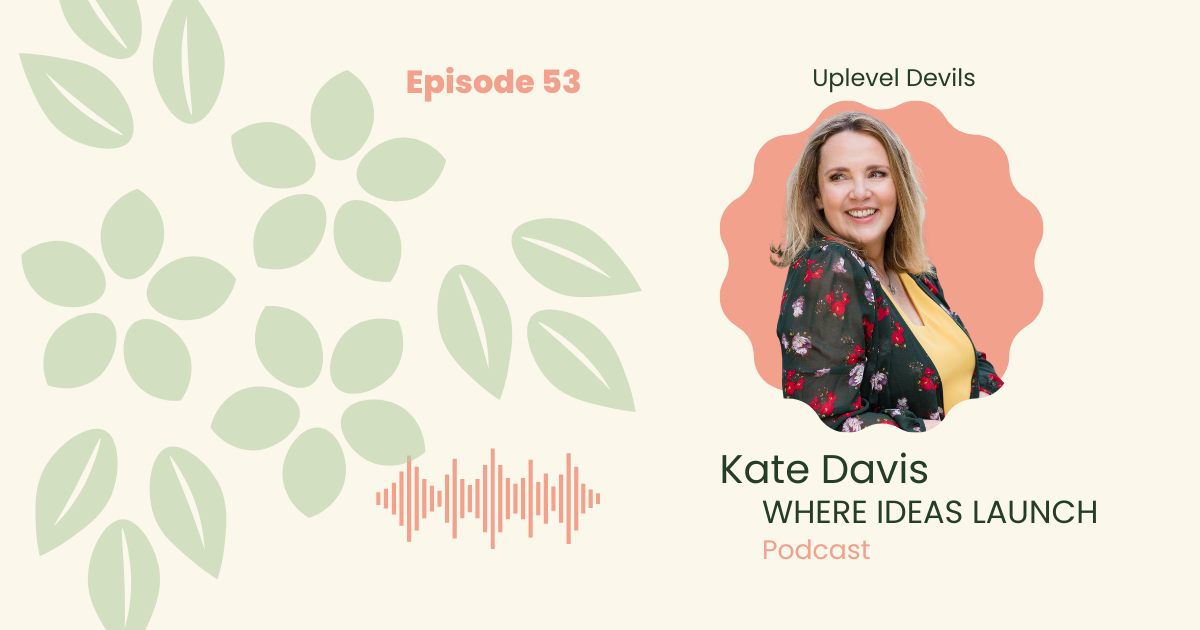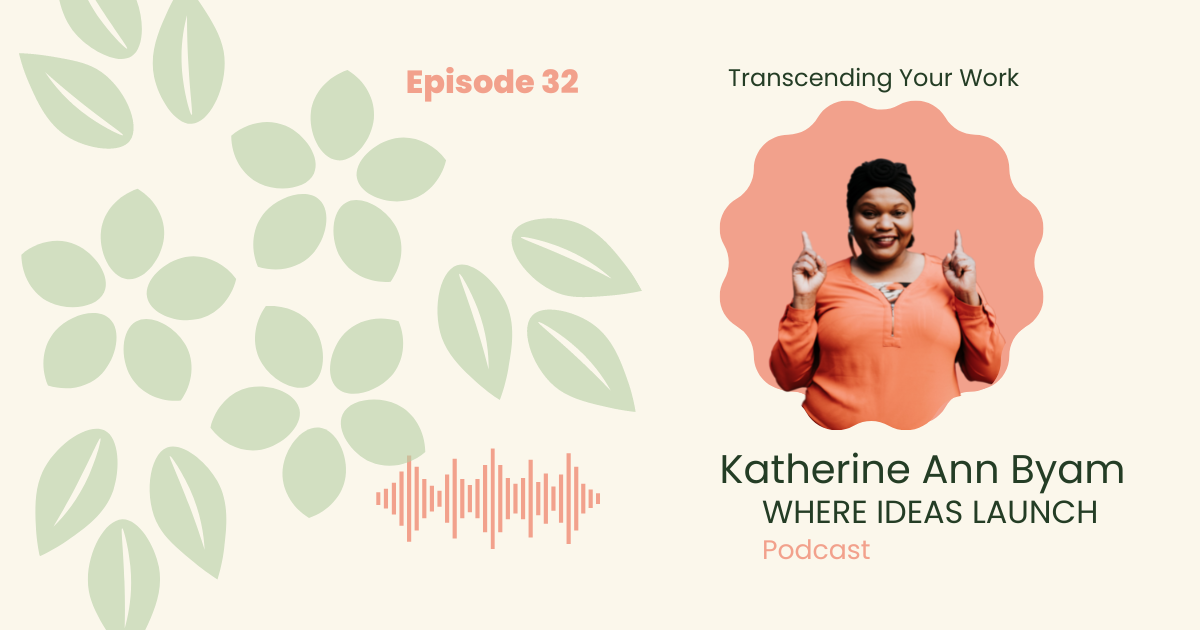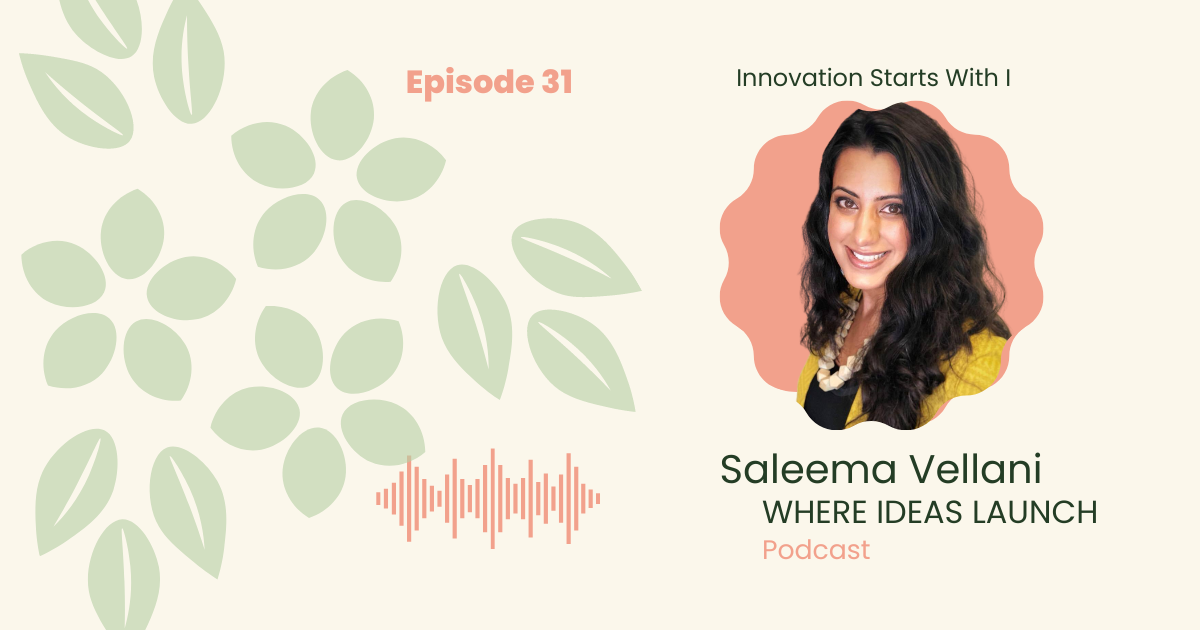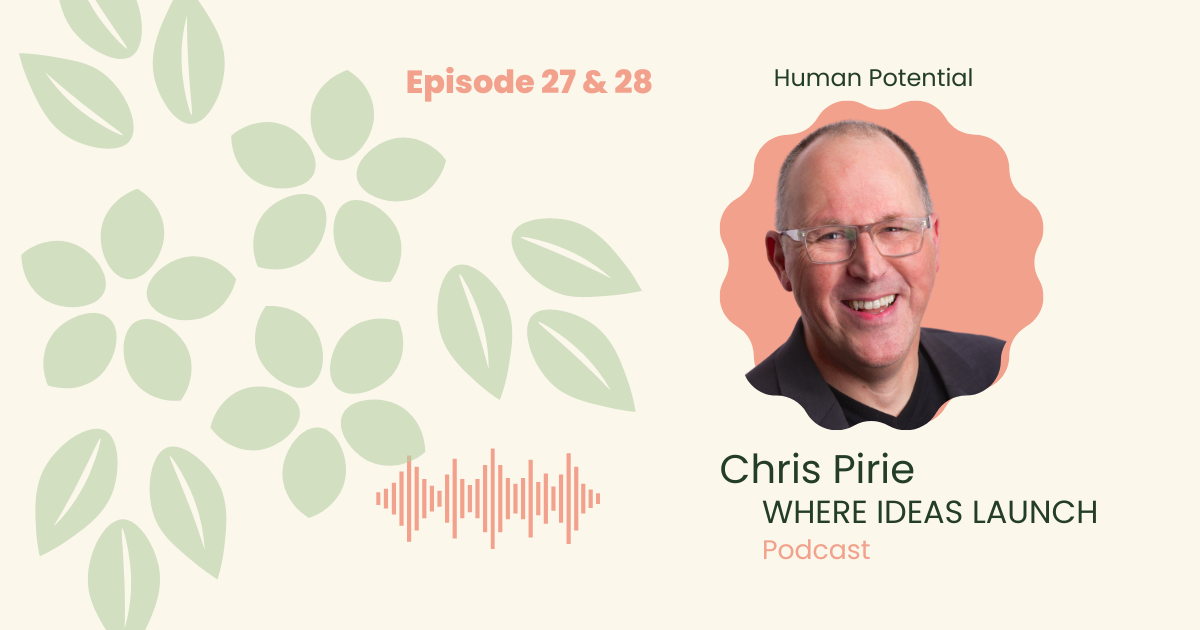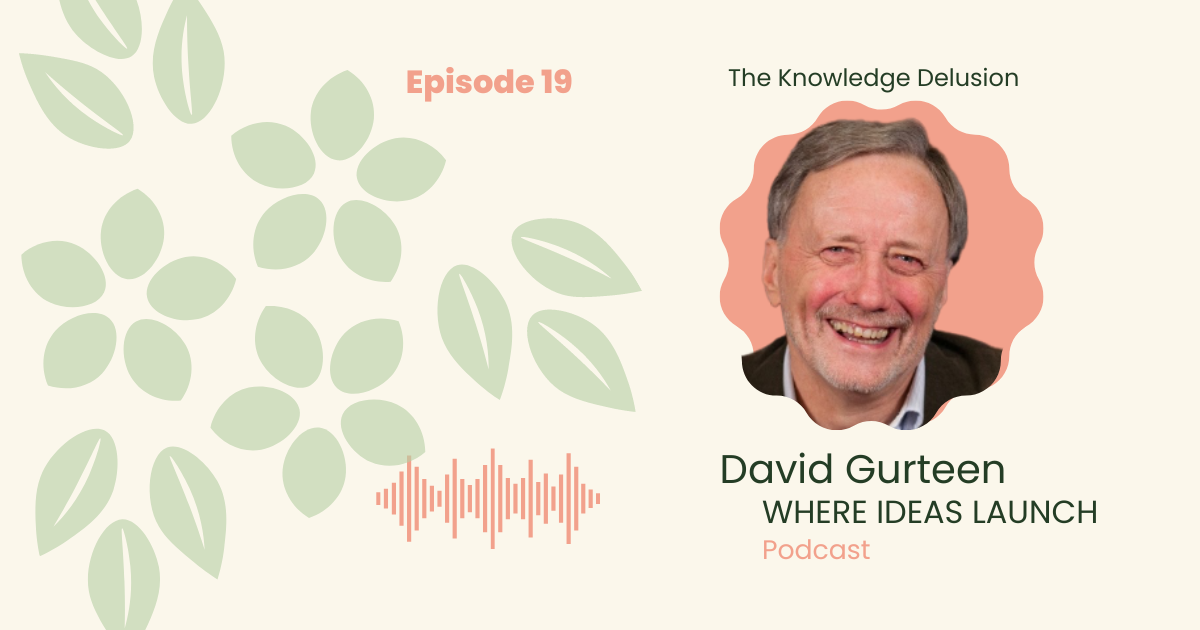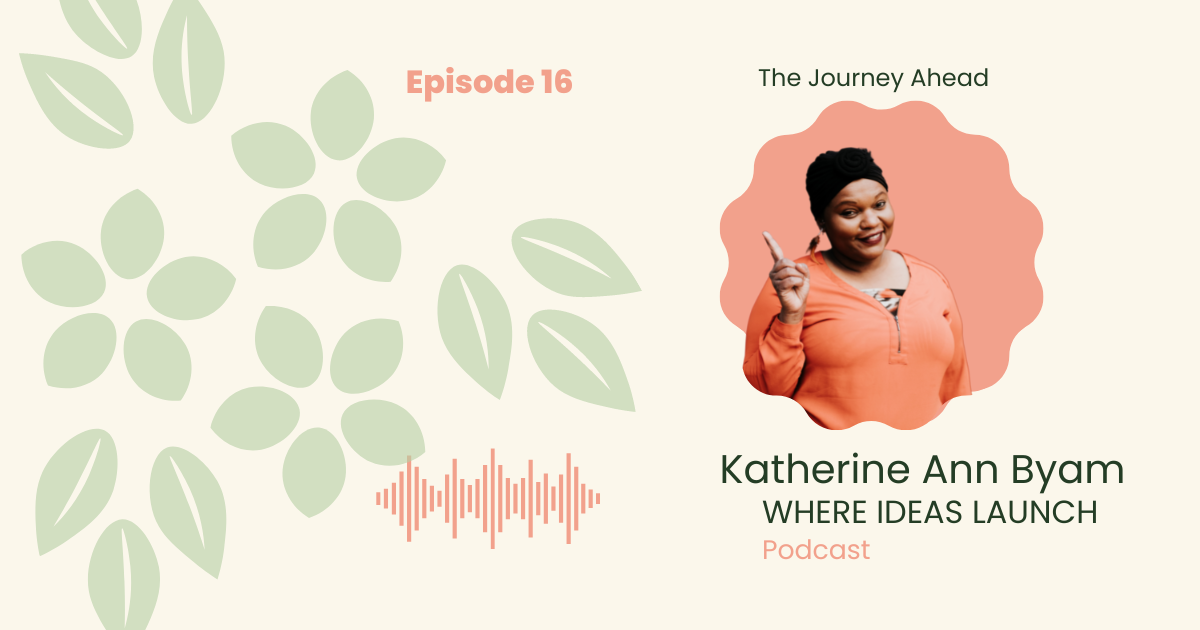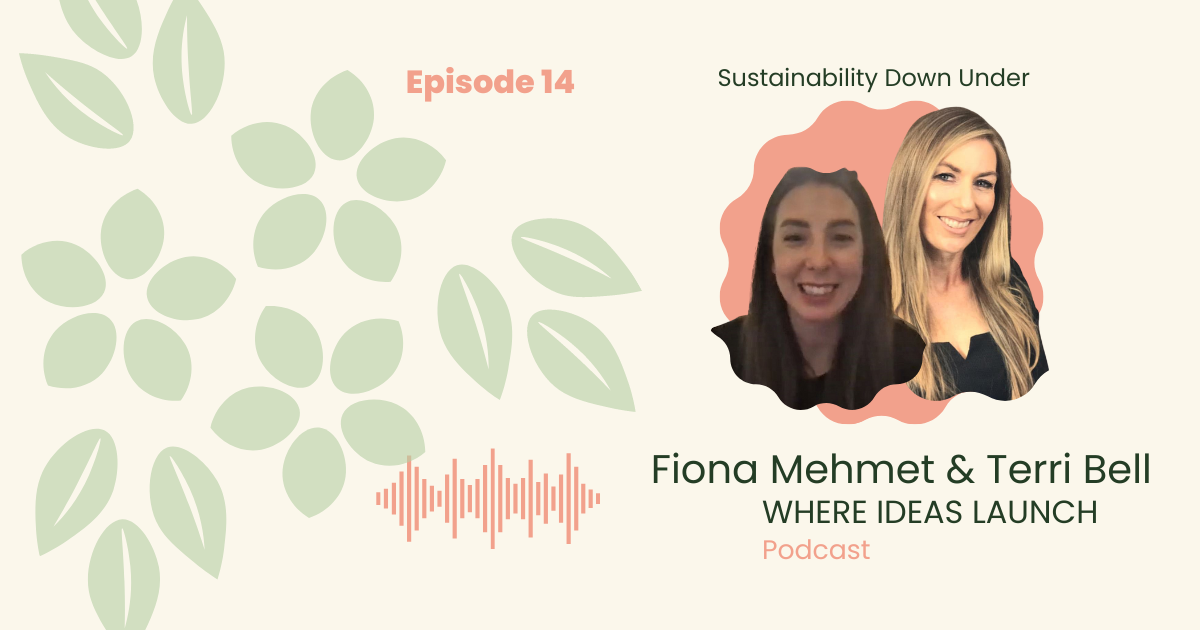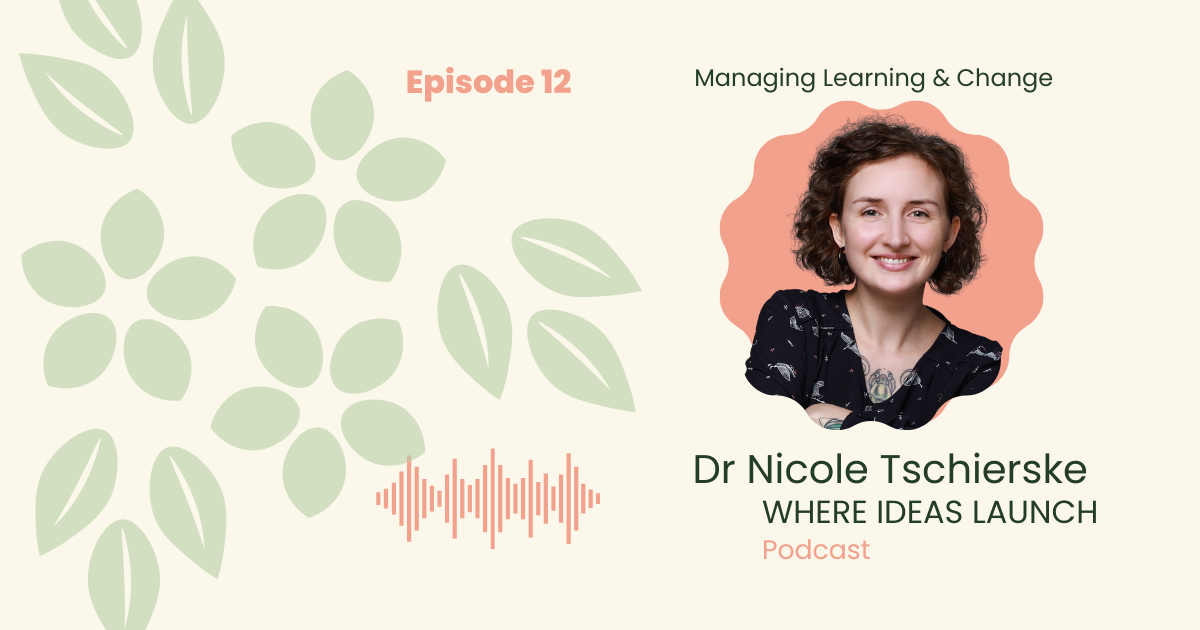095 My 2022 Gratitude Journal
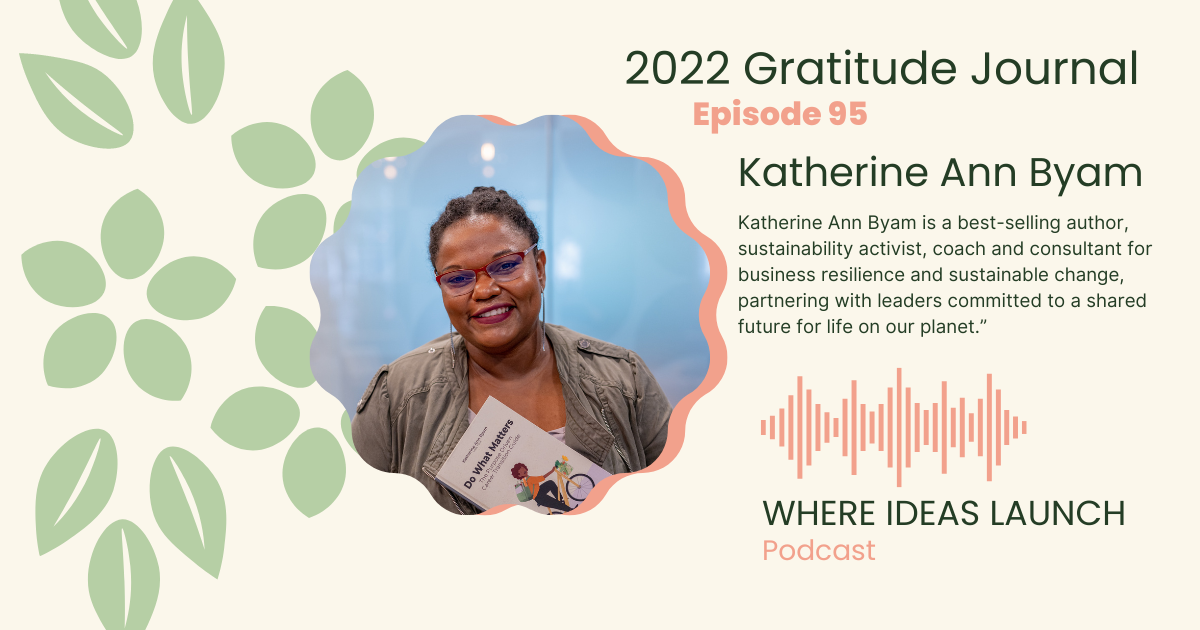
About This Episode
I don’t know anyone (they may exist, but I don’t know them) who endured the last 3 years, without some significant pain alongside it. That said, we can’t always live in the pain, and as I advocate to my clients, gratitude goes a long way to healing and pulling the threads together again.
Those of you who know me, know that I juggle many things in my business life, at varying levels of success. 2022 has been a year that stretched me, and I intend for 2023 to be the year that I bring myself back together, consolidate, and grow the way I want to impact our planet.
For the last few weeks, I’ve been running a gratitude campaign on LinkedIn and on Facebook, and this is the opportunity for you my listeners to join the party. Here’s a summary of my 12 days of gratitude for 2022.
Subscribe to Where Ideas Launch
Purchase Do What Matters
Episode Transcript
Day 1 of 12 - Growing my network with positive influences
There are amazing people doing fabulous purpose driven work all across my networks. From LinkedIn Influencers and micro influencers, to communities on Facebook, Instagram and TikTok I’ve been fortunate to fill my feeds with great positive and educational content from this rich variety of academics, scientists, practitioners, and entrepreneurs.
My top 10 of a combined place to be and people to follow for 2023 (ignoring my podcast guests until a later section of this review) are as follows: 2 influencers, 2 podcasts (other than my own) 2 communities, 2 entrepreneurs, 2 businesses.
Influencers
Alison Taylor - Executive Director at Ethical Systems, Adjunct Professor at NYU Stern School of Business. Her quippy, witty, well informed real time commentary on ethics and ESG has been absolutely my go to guide for all things business and ethics this year - no wonder she’s writing a book for HBR on business ethics!
Akima Paul Lambert - Litigation Partner at Hogan Lovells - Equity and Inclusion Advocate| Founder- Hogan Lovells' Caribbean Desk. Akima’s Friday posts are so grounded, provocative in a good way and relevant, and she’s a clear example of how you can do a corporate job and manage an engaged and relevant LinkedIn following as well!
Podcasts
Sam Cande is keeping Sustainability & Social Responsibility at the heart of conversations with her podcast sustain talks. Sam not only shares great useful content on Linkedin, but she also hosts super conversations on her show. Listen in on Youtube, Apple, Spotify or wherever you get your supply of great content!
Archita Fritz and Olivia Grant-Cream are doing some really important work with Embracing "Only" Podcast - supporting “Only’s” in the workplace with survival strategies, and a sense of community. I can hardly think of a better source of great knowledge - Thank you for your work ladies!
Communities
The largest sustainability group on Facebook is run by my friend Austin Kasso. Sustainable Living with its 133,000 strong following is a great space to get tips and ideas about how to live more sustainably day to day.
Women in Marketing by Stephanie Solheim. This is arguably the best run social community on the entire internet. Well done Stephanie! It’s a space for women who work in marketing, or entrepreneurs who do their own marketing to discuss their challenges, trouble shoot, vent, and maybe even get a few gigs. It's absolutely perfect. zero spam and exceedingly high engagement. Love this space!
Entrepreneurs/ Solopreneurs
I love to acknowledge entrepreneurs out there on their own, committed beyond question to their purpose. One such person is Cathy Mears - Martin - and her page Simply Sustainable Ideas. She’s an Author and Waste Activist - and always has something well researched and brilliant to share on waste control, and a special set of content to support your kids as well.
I also want to acknowledge a brilliant friend of mine: Neema Amin, Business Coach for Investor Readiness and funding. For entrepreneurs out there looking for funding, you’ll want to have a conversation with Neema.
Companies
Systemiq Ltd, The system change company that works for a thriving planet where sustainable economic systems drive prosperity for all. This may be the company who’s posts I’ve liked the most in 2022, you’ll want to follow them.
Patagonia - Founded by Yvon Chouinard in 1973, Patagonia is an outdoor apparel company based in Ventura, California. A certified B-Corporation, Patagonia’s mission is to save our home planet.
The company is recognized internationally for its commitment to authentic product quality and environmental activism, donating 1% of sales annually, contributing over $100 million in grants and in-kind donations since 1985.
The company made the news this year by its owner handing over his shares to the earth, using profits to support climate and sustainability related challenges.
Day 2 of 12 Days of Gratitude: Publishing a book, 15 years after I first had the idea to write one.
I want to start with the toughest feedback I had on this journey, which resulted in me re-working the book and producing a best seller with a 4.8/5 rating from 18 reviews on Amazon:
"You have many people in you - but I feel like it has some very different personas it caters to, and not everyone has that level of integration. If I were you, I'd cut out about 40% of stuff, pick one angle, or one process, and flesh out one problem in great depth."
I am so incredibly grateful to everyone who has contributed to the success of Do What Matters Careers - in 2022.
Special thanks to the book readiness team: Holly, Fanny, Harriet and Louisa who played their roles brilliantly. Vinitha, Shane and Heather, whose tough feedback made this book so much better. Ludwig Johanna, Carlos, Melissa, Kate and Archita whose early reviews got this book on the map, and finally Saleema, Amani, Frances, Owen, Mahalia, Fazeer and Emily who supported the marketing and PR Campaigns.
Thank you everyone!
Now for the best piece of feedback I received:
"This book is a revelation in so many ways that I cannot enumerate. Each chapter had me go to places I hadn’t considered going; to my experiences, my biases, my joys, and my gifts foremost among them! This book doesn’t just recommend what I should consider in my journey to building a net – positive life, it puts the steering wheel in my hand, with a road map and tangible actions to plot out what’s meaningful to me! I have lengthy notes. I highly recommend it"
Day 3 of 12 Days of Gratitude - Paying clients.
Context is everything: This post is oriented from the perspective of being a business owner. In a later gratitude post, I’ll take the perspective of the customer’s challenges and or goals that we helped them to achieve.
No business thrives without customers, and If I’m being honest, that was the biggest challenge We’ve had since we started Dieple in 2019.
Year 3, the financial year just ended in July has been our best so far, and the first time we could report a profit within 12 discrete months of trading. From consulting, coaching, course creation, speaking, book sales, we finally managed a profit, although we still couldn’t pay ourselves decently.
This is the reality of building a start-up, in a country where neither of us have deep connections and networks.
I simply want to say a huge thank you to every single customer who made a difference this year by opening up their problems and desires to us. From those who paid £1.99 for a kindle copy of my book, to those who paid thousands for consulting projects - you have all been crucial to helping us build our success.
We would be nowhere without you taking a chance on us, and we certainly hope that we have consistently lived up to your expectations.
THANK YOU.
Day 4 of 12 Days of Gratitude - My Global, Diverse and Integrative Career
Today my gratitude post is about the coming together of an incredibly diverse global career.
When I left Trinidad and Tobago in 2006 to work in Costa Rica, it was a scary pivotal moment. Learning to drive on the right side in a manual car, speaking Spanish at work, learning how to integrate with a new culture, exploring that beautiful green country.
I then moved to Internal audit and spent nearly 6 years on the road. I participated or led audit assignments in Venezuela, Argentina, Honduras, Brazil, Costa Rica, Panama, Dominican Republic, Colombia, Guyana, Jamaica, Mexico, Malaysia, Uganda, Uzbekistan, Germany, Sweden, United Kingdom, Netherlands, Romania and more with colleagues from a far longer list of countries than these.
I was more often in a hotel bed than my own. I began to call the place where I slept my home. I learned to condense my belongings into 1 suitcase and a backpack. And I learned to be incredibly curious. These experiences made me peel back the onion so to speak on my belief structures, and my why, and gave me a unique insight into the lives of people who I may have otherwise “othered”.
Today I carry 2 passports, but none of them truly represent my identity.
I understood some things now at a completely different level, such as empathy, perspective, opportunity, and injustice.
I’ve now built a portfolio career, from financial reporting and supply chain skills, to coaching, to social impact, justice, change management, capability development, innovation, sustainability reporting and getting more from less.
I owe my career today in sustainability, ethics, DEI and ESG topics to the diversity I experienced in my early career, and the educational choices and educators those experiences fostered.
Thank you!
Day 5 of 12 Days of Gratitude - Helping others
My clients are a source of inspo. In 2022, I worked with sustainability professionals just completing their masters and entering the workplace, seasoned professionals becoming partners, executives at major global corporations. I helped authors, designers and social impact businesses. I helped major companies with leadership and DEI coaching.
Here’s a sample of reviews:
The Eco Business Growth Club Incubator:
“I just want to say a huge thank you to Katherine for all the support I've received from the incubator group. I've learned so much in this time, from finance to public relations, different business models that I can apply to achieve different results, ethical sales, and responsible brand stewardship, they have been some of my favourite modules. And these are just absolutely unlike anything I've ever seen before. Some of my other favourite really amazing, and individual modules have been things like managing stress and anxiety, how to write social media copy that is actually effective, and product and supply chain information that I had honestly never considered before. So if you're a woman in sustainable business, this is the incubator group for you. This is the most supportive group of ladies from around the world.”
Sarah Udin - Founder & CEO of Amala Periods Cambodia
Corporate Work
“In March 2022, our Amazon DACH Women's Affinity Group decided to launch a mini series of podcasts, to amplify the message of purpose and social impact and the role of both in our leadership today. We hired Katherine as an external consultant to help us shape the project, source insightful guests, plan and design the content, and conduct the interviews. Katherine took complete ownership of the project, delivering incredibly vulnerable and insightful interviews from prominent leaders in Europe, and helped us create something special for our affinity group community. Thank you so much for your professional and enterprising spirit! we really enjoyed working with you on this mini podcast project ;)”
Anna Derinova Hartmann - CSR, Philanthropy and Humanitarian Aid at Amazon.
Coaching
“Katherine and I met in the hallways of one of my previous employers in 2017. I reached out to her at the end of last year when I knew it was time to start my second career pivot. Through various self-reflection exercises, one-to-one coaching sessions, and weekly meetings in the Career Courageous Club, I have humbly landed a role in an exciting and new industry. I can genuinely say that this would not have been possible without Kathy’s guidance and support. Not only did she make herself available for last minute interview preparations, but she also gave me the confidence to step outside of my comfort zone and kick a** in those calls. Kathy – You are such a beautiful person and I feel immensely grateful to have you as my Career Coach. Looking forward to our next weekly session!”
Day 6 of 12 Days of Gratitude. Growing it together.
The WISBYS - Women in Sustainable Business Awards is coming soon to your inboxes and feeds in 2023, but allow me to introduce the women who are making it happen.
Our Marketing Director - Gabriela Jauregui.
Gabriela J. is a revolutionary brand strategist and designer for rebel businesses. She has worked for a wide range of businesses from multi-billion dollar high end-luxury brands to small businesses in their growth phase. Her knowledge in various operations and marketing focused roles provides her with a unique view on branding.
Categories Team - Harriet Mitchell.
Harriet is a teacher and freelance Virtual Assistant.
After gaining a degree in Psychology and 15 years in the education sector, Harriet is a qualified teacher and works with small business owners and solo entrepreneurs to support them on their business journeys; to help them achieve a better work-life balance, specialising in editing, proofreading and small business admin.
Categories Team - Julie Breckon
Julie is an entrepreneur who has established and runs several successful independent businesses. Julie is CIPD qualified, a professionally qualified certified bookkeeper, a Bachelor of Philosophy and holds a Masters degree in Computing. Breckon Consulting and Handmade Accounts Training were both set up to provide business owners with user friendly, easy to comprehend, accessible, support and training in the financial and legislative aspects of running a business.
Our Email Marketing Lead - Davey McConnell
Davey is passionate about changing the way business is done by putting people and the planet above profits. Her eco-friendly virtual assistance business, the Eco Helper, supports fellow purpose-driven entrepreneurs and nonprofits with backend admin & tech systems as well as content creation & management so they can stay consistently visible in their communities. Besides helping businesses run smoothly, she also advises on how to do so in a more eco-conscious way.
Content & Tech Team - Jen Metcalf
Jen is a copywriter and editor for sustainable businesses and those that are heading that way. If you’re saving the world but struggling to write about it, Jen can put your actions into words that get noticed. Jen is pivoting into copywriting after 16 years as a German-to-English translator and editor for clients working on climate change. She’s a published writer and is now using her communication skills to help clients sell their ethical products, green services, and planet-friendly content.
Content & Tech Team - Vikki Ackland
Vikki is a Communications Consultant and Illustrator with a background in managing sustainable businesses. Through her work, she’s had the opportunity to oversee marketing departments, implement local outreach campaigns, support grassroots organising efforts, and create and implement social media strategies for small-to-medium-sized businesses. Her mission is to use illustration, design and copywriting to create positive change by supporting the kind of businesses she wants to see more of.
Project Manager - Sonia Castello
Sonia is an experienced professional with an extensive background in Corporate Business Administration and Events Coordination. She is a Spanish and Catalan native speaker, fluent in English and Italian too. She is qualified in Business Administration, and holds a Diploma in Event Management for Marketing & Communications with distinction, by the Chartered Institute of Marketing (CIM).
Events Expert - Michelle Miles
Michelle is the founder of the Sustainable Wedding Alliance, a purpose driven organisation driving sustainable change in the wedding industry. The Alliance works with businesses of all sizes to help them to understand sustainability, what it means for them, and how they can develop long term sustainable strategies that will benefit people, profit and planet.
Business Integrity Lead - Zoë Brinn
Zoë is the owner of 'Conscious Leaders' - she helps business owners find, train and retain their team members and grow their business, ethically. Zoë helps business owners to build their loyal teams which reduces their workload and stress. She believes that if we focus on one another in our businesses we can not only become more productive and driven, but also make society, especially in the workplace a better place to be. Zoë's background is in senior leadership education and she taught English for many years.
Founder - Katherine Ann Byam
Katherine Ann Byam is a best-selling author, sustainability activist, coach and consultant for business resilience and sustainable change, partnering with leaders committed to a shared future for life on our planet.”
This is where I also tell you about the secret code, the easter egg I’ve hidden between episodes 90 to 100 - The easter egg is “I am the earth, and the earth is me” send this sentence to me on the social media of your choice, along with an email address, and I will be in touch on your prizes!
Day 7 of 12 Days of Gratitude - Where Ideas Launch Season 5 Guests - The Great Debates of our time.
Where Ideas Launch is in its 3rd year. What an honour I have to host such an incredible set of professionals, each working to make an important difference to our lives on our one planet.
Season 5’s premise was to present ideas and discussion points that could be polarising and explore the different sides of it. It was inspired by an earlier podcast episode interview with David Gurteen on The Knowledge Delusion and Conversational Leadership, and my guests this season have not disappointed.
Season 5 starts from Episode 71 and my guests and their topics include:
071 Jenny K Wright - The Ins and Outs of Migration
072 Susan Krumdieck - Transition Engineering
073 Marie Lockwood and Sam Pitman - Sustainability Subscriptions
074 The 3 Engineers - The Adventures of Scout
075 Sarah Almond Bushell - Demystifying Nutrition and Feeding
078 Belinda Ng - Youth Perspectives on Food Security
080 Sarah Udin - Youth Perspectives on Periods
081 Gabriela Jauregui - Guilt Free Branding
082 Kate Hall - The Full Freezer
084 Belinda, Serena Coccioli and Kailin Spencer - Youth Perspectives on Climate and Community
085 Michelle Miles - The Sustainable Wedding Alliance
086 Davey McConnell - The Eco Helpers
087 Russ Avery - Marketing Good or Evil
088 Nancy Hyne - Becoming a B Corp
089 Selina Ho - Recloseted
090 Tara Pigott - Youth Perspectives on Design
091 Irete Hamdani - Ask Belynda
092 Katie Skelton - Duck for Impact
093 Jaime Snell - Eco - Crates of America
Celebrating all the podcasts achievements:
Listened to in # 96 countries.
Charted in # 89 different charts
Charted in # 46 countries
Top 20 in # 36 Charts
Top 10 in # 21 Charts
Number # 1 in 6 Charts
Ranked # 7 UK Innovation Podcasts
Ranked # 16 UK Sustainability Podcasts
Rated 5 Stars *****
Thank you!
Day 8 of 12 Days of Gratitude Do What Matters - Career and Leadership on Purpose Podcast
I wanted to deliver not just a static book, but a live system to help people make important pivots with their careers, particularly around topics such as climate change, social justice, and good corporate governance.
Do What Matters is my best selling book, but the podcast provides dynamic weekly content that builds upon the ideas in the book.
Every week I post one journal entry or 10 minute lesson from me, and one interview with a guest.
Here’s the amazing list of guests I’ve had on the show so far:
002 Shane Ward - The Purposeful Pivot
003 Tessa Clarke - Share More Waste Less
004 Sherika Sherard - Busking Through Vulnerability
005 Kysha Gibson - DEI is my Job
007 Melissa Rider Carson - Perfectly Imperfect
009 Juan Luis Betancourt - Human Intelligence
011 Chris Pirie - Potential and Purpose
013 Kirsten Forbes - Surviving Afghanistan
015 Ashley Dash - The Profitable Resume
017 Belinda Ng, Serena Coccioli, Kailin Spencer - Career Climate and Community
019 Andrew Montgomery - Black in Design
021 Marie Claire Krayenhoff - Mindfulness and Meditation
023 Lupina Valdes - Culture at work
025 Kysha Gibson - Women in Consulting
027 Nadine Bender Branham - Women in Tech
029 Harry Vargas - Future of Work and Talent
Thanks for participating and making this a great podcast - and thanks to everyone listening, we know you have around 3 million choices of podcasts, thanks for choosing us!
Celebrating all the podcasts achievements:
Listened to in # 52 countries.
Charted in # 15 different charts
Charted in # 10 countries
Top 20 in # 3 Charts
Top 10 in # 1 Charts
Rated 5 Stars *****
Day 9 of 12 Days of Gratitude My Team
Today is my last gratitude post until after the holidays, so this day is dedicated to my team. I do a great many things, and it's only possible because of the amazing people who support me.
My Instagram Socials Manager - Myca, who has been fundamental to my business growth on the gram!
About Myca Favorito
Myca is an Instagram Marketing Strategist for sustainable businesses. In just over a year in business, she has helped multiple small businesses and non-profits spread brand awareness, get a warm pool of leads, curate compelling content that converts and, maintain good and lasting relationships with their audience through creating, implementing, and overseeing purpose-driven social media strategies.
Her mission is to help businesses that do good convert more people to become leaders of change and be committed in taking small, but impactful steps towards a better and brighter tomorrow.
Next is Harriet, who started off as a client, and has become the engineer behind the scenes of my podcasts, both for Where Ideas Launch and Do What Matters Careers.
About Harriet Mitchell
After gaining a degree in Psychology and 15 years in the education sector, Harriet is a qualified teacher who boasts 2 year’s experience as a Head of School.
Harriet works with small business owners and solo entrepreneurs to support them on their business journeys; to help them achieve a better work-life balance, whilst specialising in editing, proofreading and small business admin.
A passionate advocate for the planet, Harriet also has a side hustle business where she supports people to lower their waste, make sustainable choices and gain knowledge of their impact on earth. She creates a range of plastic free and reusable alternatives for the home. Her children are a driving force and are behind her business name; TillyBoo’s.
My Bookkeeper Kat Stonehill. Kat and her company Pinder Stonehill Supporting charities, social enterprises and values led small businesses to take control of their accounts and understand their numbers.
Kat is thorough, always on time, and supportive, and her support has been amazing this past year!
Finally, to my partner in life and business, Christophe.
Chris is CIO and Data Scientist and the force behind Dieple Consulting, supporting complex IT integration and data projects in medium sized companies for the past few years. Chris's work has been so influential, he's in the process of being snapped up by a larger firm in 2023, giving him the opportunity to work on much bigger projects in the future. We will miss him Dieple Consulting & Training Limited, and it will mean changes for our company! More on those changes in 2023!!
Thanks for joining me on this gratitude Journey for the past couple weeks, and tune in for more next week and the first week of Jan, as I provide the final 3 days of gratitude for a year well spent 🙂
Day 10 of 12 Days of Gratitude: Maternity
It’s a great time to dedicate a post to the importance of family when you are building anything; a business, a career, a life.
I spent the last few days with my partner's family in France. We come from different cultures, so there are many differences in the meals, the traditions, the greetings, but there are a few fundamentals that are pretty much the same.
Mothers are the matriarchs and “boss” things when it comes to family gatherings: in a role that appears to come naturally to them. Things I’ve found to be similar between the UK and France;
The significance of the occasion - as evidenced by the cutlery you don’t see all year long until Christmas.
The supply of such a broad variety of food: They are seldom happy until you are full to overflowing, the instinct to facilitate life through feeding is undeniable in every culture I’ve experienced; and that’s quite a few!
Family gives you a different perspective. The continuation of your line, and for most with young children, family represents legacy. This belief system is so deeply entrenched, that often we can’t see our descendents outside of the relatives they remind us of. We are hardly our own identity when around family, which has both upsides and downsides. The strength of family is in the feeling of community.
For those of us without children, we form other types of communities, with colleagues, clients, friends. When we come to our family gatherings, there are perhaps fewer plates at the table each time, and the nostalgia can sometimes be left with a tinge of sadness.
When your children don’t define your legacy, you are perhaps more driven to make your own life mean something: represent more than just one life well lived. Some do this through wealth accumulation, others through impact.
As I watched my mum in law work her magic, and listened to my mom via whatsapp talk about preparing food back home for the many visitors she expects to come through her doors over the 2 main holidays, I realised how much of our lives we owe to the maternal presences in them, and how their selflessness continues to inspire our own.
This is dedicated to mothers, and my gratitude for the life they give.
Day 11 of 12 Days of Gratitude - The Haters
There’s something about negativity that gives us extra motivation to succeed, if we can find a way to turn that feedback into useful insight when needed.
Life, careers, work, relationships, come with tough situations, and we are better off learning how to deal with them, than pretending they don’t exist.
Greta nailed her troll master on twitter last week, showing that even the most notorious of trolls can be thwarted.
The thing about the haters is this - often they represent a minority, and integrating their feedback without further exploration can be harmful to your business, unless the view is a common one, and these are the few people willing to share their thoughts with you. This is when that age old serenity prayer becomes relevant: understanding what to change, what to maintain the same, and knowing the difference.
The ways I’ve learned to deal with online, or other forms of hate:
1- Look for positive intentions.
2- When the positive intent is hard to find, look at the context.
3- The service relationship or nature of the transaction.
4- Sometimes it’s just hate.
5 - The Gaslighters.
6 - Race relations.
We don’t run from challenges, we embrace them when we think they make us stronger.
Day 12 of 12 Days of Gratitude My Wellbeing
On my final day of gratitude, I’d like to thank me!
The last few years have not been easy, culminating in a 2022 which saw me doing more blood tests and medical examinations than any other year, mainly because of one thing: balance, or lack of it.
Still, my mind and body got me to this point, almost working against each other, just imagine what they can achieve if they co-operated for a change?
As we ring in 2023, I’ll be working on making mental me and physical me one.
I recently watched Limitless - a National Geographic documentary by Chris Hemsworth. Everything he did in those 6 episodes is way extreme for me, but they prompted me to acknowledge how much stronger I can be if I gave more gravitas in my decision making to my overall wellbeing.
So today I want to thank body and mind for enduring their lack of synchronicity to support me so far, and I hope for them to be best friends in 2023.
Happy New Year Everyone!
